This grocery shopping site lets you filter online retailers by your values
“I would always leave feeling like I compromised on something,” he says. That experience spurred him to start GreenChoice, an online market that allows users to filter items by their diet—whether vegan, gluten-free, low-sodium, or an array of allergies—and by their values, such as organic, low carbon footprint, or even no palm oil.
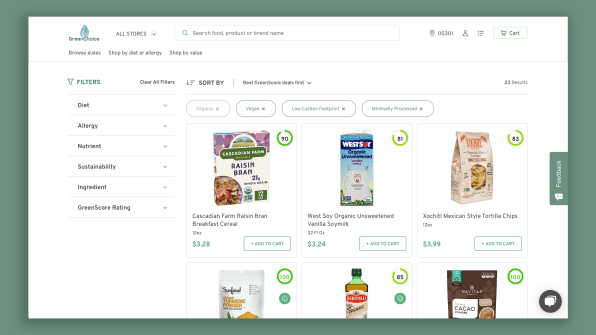
GreenChoice originally launched in 2019 as a mobile app to help people with their in-store shopping decisions. Now, it’s an online marketplace where users can shop from Walmart, Target, or Walgreens, and filter their choices by more than 90 food preferences or values. GreenChoice will also estimate the carbon footprint of your order plus shipping and offset that total by investing in wind power and reforestation projects.
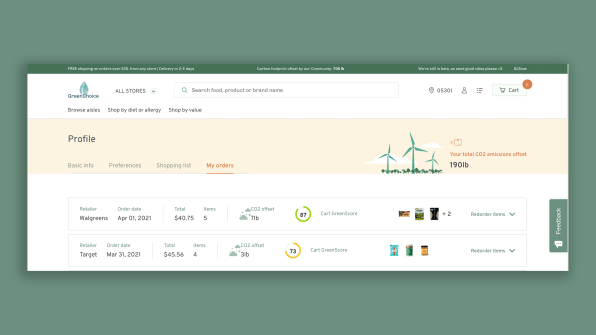
To start shopping on GreenChoice, you have to create an account and take a quiz, which asks if you follow a certain diet—vegetarian, keto, low-FODMAP (a diet often recommended to manage IBS)—or have any allergies, and to rate on a scale of 1 to 10 how important you find four different values: nutrition, processing, food safety, and the environment. The site shows you the top picks for your values, and every product includes a GreenScore rating out of 100, the average of how the item scored in each of those four areas. The information for all that comes from the FDA, EPA, Worth Health Organization, United States Department of Agriculture, and scientific studies.
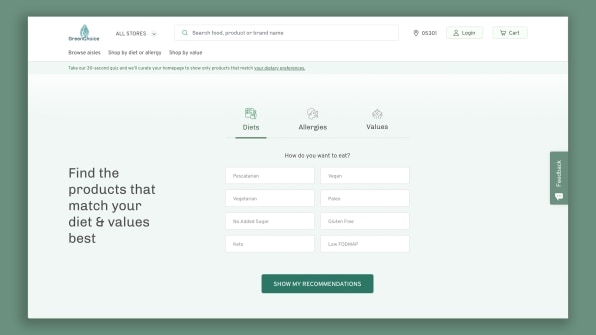
Search for something such as “granola bars,” and you can filter out additional allergens or ingredients you want to avoid. When you look at one item in particular, the site shows you how well it scored in each GreenChoice area. One option might have a high environment score because of its small carbon footprint, for example, but score badly in terms of processing because of the use of refined oils. Below all that, the site will list any alternatives that have higher ratings.
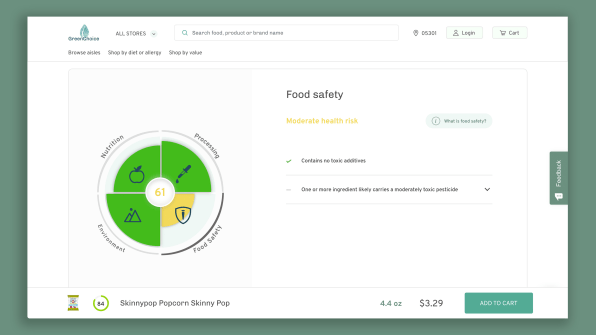
“There’s a growing number of consumers that want to make healthy choices and vote with their dollars, but they don’t know where to start or what to trust,” Karlan-Mason says. In a typical grocery store, you might face an entire aisle of granola bars or a whole wall of egg cartons without any breakdown of ingredients or info on what terms such as “cage free” really mean. People can be overwhelmed by those choices, and also by the greenwashing or “healthwashing” terms on food packaging. GreenChoice aims to narrow down your grocery shopping, so you only see products that are relevant to the way you want to eat.
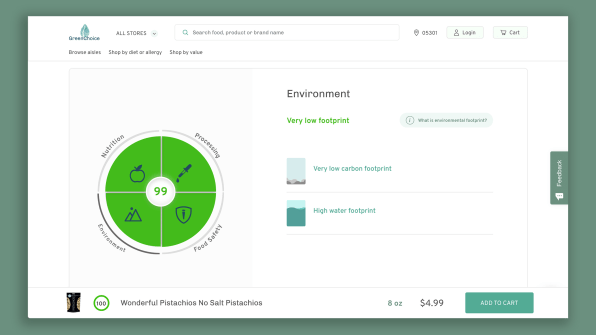
You don’t have to be a paid member to shop, but there are membership tiers. For $10 a month, users get unlimited access to the entire product database (3,000 items are shoppable through GreenChoice, but with this membership level, users can see nutrition and climate ratings for 300,000 items, even if they can’t order them directly). Those members will also avoid the $3.50 service charge per order and get deeper insights on why an item got the GreenChoice rating it did—for instance, what specific processed ingredients are included or the names of any toxic additives. Higher tiers add the options to get a personalized snack box or have a live chat with registered dietitians.
Not everyone wants that level of detail on their food, Karlan-Mason admits—but some do, and they may be shopping just like he used to, phone out in a grocery aisle, looking up as much information as possible. You might not be able to replace all your shopping or research with GreenChoice—searching for coffee, for example, there’s no way to filter by “fair trade,” and the environment score just concerns a product’s carbon and water footprint, not its packaging (Karlan-Mason hinted a plastic offset may be coming soon, but it’s unclear if that will correlate with the type of waste your shopping produces)—but it aims to take at least some label reading and research out of the task of stocking your pantry.
(42)



